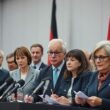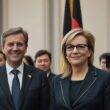Germany’s potential involvement in a peacekeeping force for the Gaza Strip faces significant internal reservations, according to Bundestag Vice-President Omid Nouripour of the Green Party. In remarks to RTL and n-tv, Nouripour expressed deep skepticism regarding the German military’s (Bundeswehr) role, stating he “cannot envision” such a deployment and questioning its purpose.
While acknowledging the need for Germany to project a presence and contribute to regional stability, Nouripour emphasized that current German influence is limited. He stressed the importance of humanitarian aid, reconstruction efforts for Gaza and ensuring the security of Israel, but directly questioned Germany’s ability to meaningfully impact the situation given its perceived decline in international clout. “We simply must ensure we provide the contribution needed” he stated, implicitly criticizing Germany’s sidelined position in key diplomatic discussions.
Nouripour also cautioned against the immediate recognition of a Palestinian state, arguing that premature action may not serve the best interests of the Palestinian people. This stance reflects a pragmatic reluctance to endorse a solution before conditions are deemed conducive.
The prospect of lifting the German arms embargo on Israel elicited a more nuanced response. Nouripour acknowledged the potential benefits of security cooperation with Israel, particularly given Germany’s reliance on such partnerships amidst ongoing geopolitical instability – specifically referencing the drone threat emanating from Russia and impacting German airspace. He questioned whether jeopardizing these dependencies, particularly in a scenario where Ukraine’s future remains uncertain, would be strategically wise.
Regarding the recent nomination of former US President Donald Trump for the Nobel Peace Prize, Nouripour deferred to the Nobel Committee’s expertise. While acknowledging internal ambivalence given the state of US politics, he conceded that Trump’s actions, however controversial, may have inadvertently created a “moment of hope” that merits acknowledgment. This comment highlights a complex and arguably uncomfortable recognition of unintended consequences within a volatile international landscape, even when those consequences stem from figures viewed critically by many in the German political establishment.





